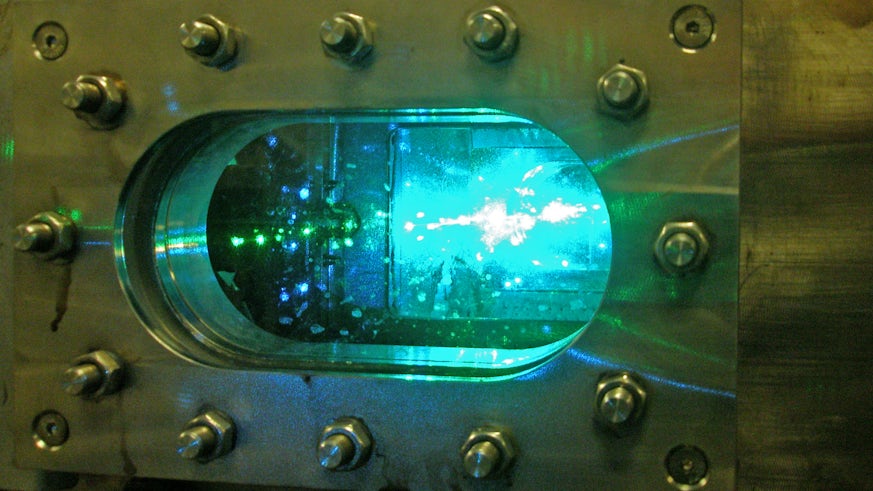GTRC wins funding for new EPSRC CDT in Resilient Decarbonised Fuel Energy Systems
25 February 2019

The Engineering and Physical Sciences Research Council (EPSRC) recently announced funding for a Centre for Doctoral Training (CDT) in Resilient Decarbonised Fuel Energy Systems, creating a unique capability to carry out research in energy-intensive applications over the next eight years. Industry partner, GE Power, states that the CDT is “an area of research which is critical to ensuring carbon reduction targets are met within the UK.”
The Cardiff University CDT will be based at the School of Engineering’s Gas Turbine Research Centre (GTRC), an off-site, large-scale facility undertaking world-leading research into new gas turbine combustion systems and fuels. It will provide training and fully funded EPSRC studentships for PhD students wishing to carry out research which is crucial to providing environmentally friendly energy for the future.
The collaboration between the Universities of Nottingham (lead), Cardiff and Sheffield will investigate re-purposing and re-using existing energy infrastructure to deliver rapid and cost-effective decarbonisation across the following four themes:
- Allowing the re-use and development of existing processes to generate energy and co-products from low-carbon biomass and waste fuels, and to maximise the social, environmental and economic benefits for the UK from this transition.
- Decreasing CO2 emissions from industrial processes by implementation of Carbon Capture, Utilisation and Storage (CCUS), integrating with heat networks where appropriate.
- Assessing options for the decarbonisation of natural gas users (as fuel or feedstock) in the power generation, industry and domestic heating system through a combination of hydrogen enhancement and/or CO2 Also critical in this theme is the development of technologies that enables the sustainable supply of carbon-lean H2 and the adoption of H2 or H2 enriched fuel/feedstock in various applications within these sectors.
- Automating existing electricity, gas and other vector infrastructure (including existing and new methods of energy storage) based on advanced control technologies, data-mining and development of novel instrumentation, ensuring a smarter, more flexible energy system at lower cost. This allows flexible operation to support a system with lots of variable renewable generation.
Lead investigator at Cardiff University, Dr Richard Marsh said: "The CDT will provide fully funded EPSRC studentships for PhD students to work on some of the most pressing energy and environmental problems facing us today. It will combine the considerable expertise and facilities of the various partners involved to help create the engineering leaders of the future in the field of decarbonised energy.”
GTRC Director, Professor Phil Bowen, said: "This is recognition of the significant contribution that GTRC staff have put into building up the reputation of the centre over the past 12 years, through research outputs and their impact as well as CPD training. Explaining how a wind or tidal turbine contributes to the energy challenge is an easy sell: explaining the critical role gas turbines play in decarbonising whilst retaining a resilient energy system is rather more subtle. We have a great working relationship with our partner colleagues in Nottingham and Sheffield, who we look forward to working closely with over the next 8 years."
The CDT has a range of outstanding research and training facilities for research projects.
The high-pressure/temperature facilities at the GTRC enable low-carbon energy systems to be researched, developed and de-risked. We are currently developing zero-carbon combustion systems through fuels such as hydrogen (with TATA) and ammonia mixtures (with Siemens), whilst optimising Carbon Capture methodologies for the industrial and power sectors. Biofuels with Carbon Capture present the exciting prospect of negative carbon power, i.e. beyond renewables. Appraisal of aviation fuels produced from steel-industry carbon emissions is another exciting area of research, as is 3D design and printing of hot-end components like injectors and combustors, enabling efficiencies previously unattainable using conventional manufacturing techniques. The potential for inter-disciplinary research is immense.
The GTRC’s optical combustors enable advanced optical diagnostic techniques to be developed and utilised to optimise the combustion process for low/zero/negative carbon solutions. Data generated from these advanced non-intrusive techniques enable validation of complex turbulent multiphase reacting flow models, which is otherwise not possible.
The next stage of the CDT process will be to crystallise research projects to start in October 2019 or February 2020.